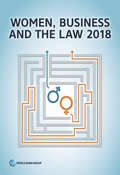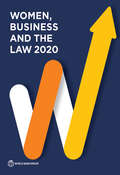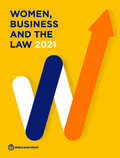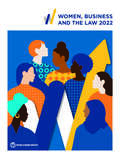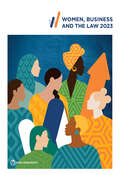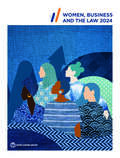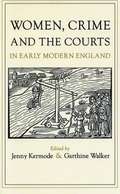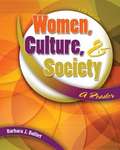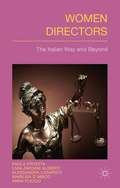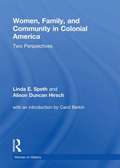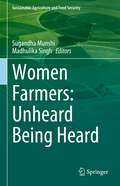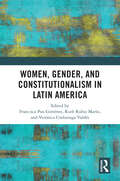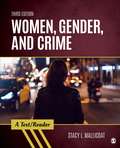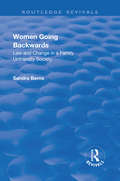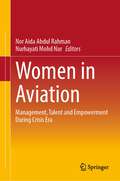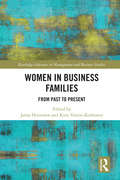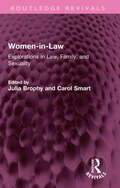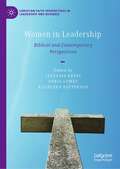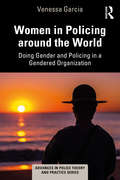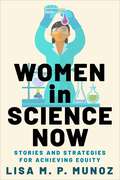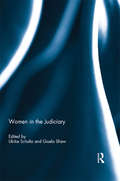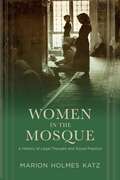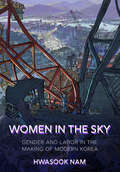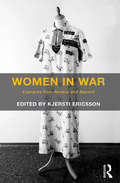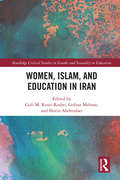- Table View
- List View
Women, Business and the Law 2018
by World Bank GroupHow can governments ensure that women have the same employment and entrepreneurship opportunities as men? One important step is to level the legal playing field so that the rules for operating in the worlds of work and business apply equally regardless of gender. Women, Business and the Law 2018, the fifth edition in a series, examines laws affecting women’s economic inclusion in 189 economies worldwide. It tracks progress that has been made over the past two years while identifying opportunities for reform to ensure economic empowerment for all. The report updates all indicators as of June 1, 2017 and explores new areas of research, including financial inclusion.
Women, Business and the Law 2020 (Women, Business and the Law)
by World Bank GroupThe World Bank Group’s Women, Business and the Law examines laws and regulations affecting women’s prospects as entrepreneurs and employees across 190 economies. Its goal is to inform policy discussions on how to remove legal restrictions on women and promote research on how to improve women’s economic inclusion.
Women, Business and the Law 2021 (Women, Business and the Law)
by World BankWomen, Business and the Law 2021 is the seventh in a series of annual studies measuring the laws and regulations that affect women’s economic opportunity in 190 economies. The project presents eight indicators structured around women’s interactions with the law as they move through their lives and careers: Mobility, Workplace, Pay, Marriage, Parenthood, Entrepreneurship, Assets, and Pension. This year’s report updates all indicators as of October 1, 2020 and builds evidence of the links between legal gender equality and women’s economic inclusion. By examining the economic decisions women make throughout their working lives, as well as the pace of reform over the past 50 years, Women, Business and the Law 2021 makes an important contribution to research and policy discussions about the state of women’s economic empowerment. Prepared during a global pandemic that threatens progress toward gender equality, this edition also includes important findings on government responses to COVID-19 and pilot research related to childcare and women’s access to justice.
Women, Business and the Law 2022 (Women, Business and the Law)
by World BankWomen, Business and the Law 2022 is the eighth in a series of annual studies measuring progress toward gender equality in 190 economies by examining the laws and regulations that affect women’s economic opportunity. The project presents eight indicators structured around women’s interactions with the law as they move through their lives and careers: Mobility, Workplace, Pay, Marriage, Parenthood, Entrepreneurship, Assets, and Pension. This year, the study also includes preliminary findings and analysis of pilot data collected on the provision of childcare and the operation of laws in practice. Examining the economic decisions women make throughout their working lives, as well as progress toward gender equality over the last 50 years, the study is meant to inform research and policy discussions about the state of women’s inclusion. By presenting powerful examples of change and highlighting the gaps still remaining, Women, Business and the Law 2022 is a vital tool in the work of ensuring economic empowerment for all. The data are current as of October 1, 2021.
Women, Business and the Law 2023 (Women, Business and the Law)
by World BankWomen, Business and the Law 2023 is the ninth in a series of annual studies measuring the laws and regulations that affect women’s economic opportunity in 190 economies.The project presents eight indicators structured around women’s interactions with the law as they move through their lives and careers: Mobility, Workplace, Pay, Marriage, Parenthood, Entrepreneurship, Assets, and Pension. The 2023 edition identifies barriers to women’s economic participation and encourages reform of discriminatory laws. This year, the study also includes research, a literature review, and analysis of 53 years of reforms for women’s rights. Examining the economic decisions that women make throughout their working lives as well as tracking regulatory changes from 1970 to today, the study makes an important contribution to research and policy discussions about the state of women’s economic opportunities. By presenting powerful examples of change and highlighting the gaps still remaining, Women, Business and the Law 2023 is a vital tool in ensuring economic empowerment for all. Data in Women, Business and the Law 2023 are current as of October 1, 2022.
Women, Business and the Law 2024 (Women, Business and the Law)
by World BankWomen, Business and the Law 2024 is the 10th in a series of annual studies measuring the enabling conditions that affect women’s economic opportunity in 190 economies. To present a more complete picture of the global environment that enables women’s socioeconomic participation, this year Women, Business and the Law introduces two new indicators—Safety and Childcare—and presents findings on the implementation gap between laws (de jure) and how they function in practice (de facto). This study presents three indexes: (1) legal frameworks, (2) supportive frameworks (policies, institutions, services, data, budget, and access to justice), and (3) expert opinions on women’s rights in practice in the areas measured. The study’s 10 indicators—Safety, Mobility, Workplace, Pay, Marriage, Parenthood, Childcare, Entrepreneurship, Assets, and Pension—are structured around the different stages of a woman’s working life. Findings from this new research can inform policy discussions to ensure women’s full and equal participation in the economy. The indicators build evidence of the critical relationship between legal gender equality and women’s employment and entrepreneurship. Data in Women, Business and the Law 2024 are current as of October 1, 2023. wbl.worldbank.org
Women, Crime, and the Courts in Early Modern England
by Jennifer Kermode Garthine WalkerRecent years have witnessed a considerable body of published research on both crime and women in the early modern period. There have been few attempts, however, to synthesize such studies and to examine in detail the relationship between the law and women's lives. This collection of seven original essays explores that relationship by examining the nature and extent of women's criminal activity and surveying the connections between women, their legal position, and their involvement in legal processes. The words, actions, and treatment of women who came before the courts as plaintiffs, defendants, and witnesses are examined here in a variety of contexts, ranging from the assertion of a variety of rights to scolding, thieving, and witchcraft. The contributors demonstrate that women were far from passive victims in a male-dominated legal system. As both breakers of the law and important agents of its enforcement, women were far more assertive than their formal legal positions would suggest. The contributors are Garthine Walker, Jenny Kermode, Laura Gowing, Martin Ingram, Jim Sharpe, Malcolm Gaskill, Geoffrey L. Hudson, and Tim Stretton.
Women, Culture, and Society: A Reader (Fifth Edition)
by Barbara J. BalllietThis book encourages students to rethink and revise the connections proposed in this reader, and make anew the significance of these texts in their own lives. These big concepts should encourage discussion, debate, and thought. Full text of major essays Contemporary issues including: masculinity studies, disability studies, war, terrorism, prisons, fear of feminism, and gay marriage Classic essays and documents from first and second wave feminist thinkers Critiques of how the history of feminism has been written Artilcles Include: Becky Thompson - Multiracial Feminism: Recasting the Chronology of Second Wave Feminism Judith Lorber - The Social Construction of Gender Ruth Frankenberg - The Making and Unmaking of Whiteness Anne Fausto Sterling - The Five Sexes, revisited"
Women Directors
by Paola Profeta Livia Amidani Aliberti Alessandra Casarico Marilisa D’amico Anna PuccioWomen Directors analyzes the Italian law on gender quotas in boards as a vital opportunity for the country and a key international case. It provides a broad perspective of the new Italian experience, which has the potential of influencing the way of addressing gender issues worldwide.
Women, Family, and Community in Colonial America: Two Perspectives
by Linda SpethThe influence of women in the colonial family and the community is examined using tax and probate records of southside Colonial Virginia.
Women Farmers: Unheard Being Heard (Sustainability Sciences in Asia and Africa)
by Sugandha Munshi Madhulika SinghThis edited volume celebrates the positive stories and small changes happening with respect to gender equality in the field of agriculture. This book identify crisis which a woman faces in the field of agriculture as a farmer. The book shares unsung stories of women farmers who are bringing change at the grassroots. It puts together the positive developments experienced by the experts, researchers, professional while working for and with women farmers, to highlight the challenges to bring equity in agriculture. Women in agriculture often lack identity where either they are recognized as farmer’s wife or a farm labourer. Women farmers who contribute 60 percent in to farm practices like sowing, transplanting, fertilizer application, weeding, harvesting, winnowing are merely recognised and provided an equal level playing field. Women are also found participating in the various forms of processing and marketing of agriculture produce, along with the cultivation but system has failed to protect their rights and offer them a platform to voice their concerns. This book shares the process, challenges, experience, strategy from the narrative of progressive women farmers so as to highlight and understand what it takes to bring changes for achieving the goals of an equitable farming ecosystems. The book is a relevant reading material for students, researchers, professionals and policy advocates in agriculture and gender research.
Women, Gender, and Constitutionalism in Latin America
by Francisca Pou Giménez, Ruth Rubio Marín, and Verónica Undurraga ValdésThis book discusses to what extent and how constitutional design and practice in Latin America have helped in combatting the subordination of women and LGBTQIA+ people. Covering 11 jurisdictions, the chapters identify the main elements of the constitutional gender order and survey jurisprudential and legislative developments in different areas, incorporating contextual analysis and references to history, political dynamics, social movements, feminist struggles, normative efficacy, and policy.In the context of a constitutionalism that has been celebrated as particularly innovative and socially engaged, the book assesses constitutional performance in the quest to supersede the separate gendered spheres tradition and the subordination of women and sexual minorities to heteronormative hegemony. It fills an important gap in the field of gender and constitutionalism, which has paid very little attention to Latin America compared to the Anglo-American legal world and continental Europe. It identifies regional trends, but also variables which account for the diversity of approaches in various jurisdictions.The book provides much-needed insight into matters that are relevant for legal and socio-legal scholars, an ever-growing number of social actors and movements, and all those interested in comparative constitutionalism and in the intersections between law and gender.
Women, Gender, and Crime: A Text/Reader, 3rd Edition (SAGE Text/Reader Series in Criminology and Criminal Justice)
by Stacy L. MallicoatWomen, Gender, and Crime: A Text/Reader, Third Edition presents issues of gender, crime, and criminal justice in context through edited research articles enhanced by brief authored sections. Each article is carefully edited to demonstrate the application of the concepts presented in the text. Author Stacy Mallicoat brings all the content together by highlighting underlying themes of race and diversity, helping students gain a better understanding of women as victims, offenders, and criminal justice professionals. <P><P>New to the Third Edition: <ul> <li>More than 50% new journal articles introduce you to important topics such as transformative feminist criminology, human trafficking, gender specific programs for juveniles, the impact of social ties on long term recidivism, social relationships and group dynamics for female inmates, and more.</li> <li>Fourteen new or updated case studies present compelling examples that connect concepts to real-life occurrences by covering key issues, such as, sexual victimization at military academies, stalking on college campuses, pregnancy and policing, and self-care for victim advocates. </li> <li>Expanded coverage of critical topics make you aware of important issues such as multiple marginalities and LGBT populations, cyberstalking, labor trafficking, women and pretrial release, and challenges faced by female police officers. Updated statistics, graphs, and tables demonstrate the most recent trends in criminology.</li> </ul>
Women Going Backwards: Law and Change in a Family Unfriendly Society (Routledge Revivals)
by Sandra BernsThis title was first published in 2002. Gender has become a culturally laden signifier. Sometimes used to differentiate the social from the biological, gender itself has become gendered. In common parlance gender issues often slide inexorably into women's issues and are in that way designated as marginal and outside the concerns and lives of ordinary men and women. In this book, signifiers such as gender, worker and family are unpacked and suggestions are made as to how common usage of these signifiers reinforce existing practices and act as barriers to change. Some of these changes are legal, others are social and others are driven by political and policy agendas. By looking at five areas: equal opportunity law, family law, industrial relations law, social welfare law and taxation law, which are all profoundly gendered, the author examines ways in which men and women see their roles and choices and how these are related to the state, as citizens. The author then examines the definition of citizenship and looks in detail at the concept of the unencumbered citizen, who is unencumbered by interpersonal obligations, responsibilities and beliefs, using comparative material from Australia, North America and the United Kingdom.
Women in Aviation: Management, Talent and Empowerment During Crisis Era
by Nor Aida Abdul Rahman Nurhayati Mohd NurThis book is a comprehensive review and empirical study on women capacity building, leadership characteristics, talent management and women challenges in crises era from an aviation perspective. This book offers a blend of comprehensive and extensive high quality research outputs from highly reputed authors and editors. This book aims to address the following objectives:• explores the women empowerment facets in aviation and its challenges in crisis era, which will be covered throughout the book. Such facets of women empowerment include women awareness of the right of equality, self-confidence, changes in society and at the workplace and capacity building.• examines the women leadership values in aviation, which will be covered throughout the book. Such leadership values include women leader behaviour, impact and followers, leadership characteristics and technology skills• covers key challenges that women in aviation experiencing during crisis era of pandemic Covid-19, war crisis and disaster• readers will be able to understand women research studies in unexplored field, aviation from different points of view. In this sense, they will be able to compare, contrast and comprehend whether the women issue from aviation sector are difference lenses, and delivered similarly or otherwise in different sector or parts of the world. This enables readers to understand differences and subsequent application towards women empowerment and leadership in wider context• readers will gain benefit from multi worldwide contributors which coming from women leaders in the industry who’s also a member of worldwide women association such as women in logistics and transport (WILAT), Women in Transport (WIT), Women in Corporate Aviation (WCA). Moreover, this book, proposes a mixture of theory and practice with effective case studies, aims at reaching primarily doctoral, postgraduate, graduate, and final year undergraduate students in business and marketing, logistics and transport, gender studies, cultural studies, and it will also useful and suitable to read for both managers and decision-makers around the world too.
Women in Business Families: From Past to Present (Routledge Advances in Management and Business Studies)
by Jarna Heinonen Kirsi Vainio-KorhonenFor centuries, almost all economic activity was family-based. The family business rested on the division of labor among family members. Therefore the family was both socially and economically the foundation of the family business. Families were not only production units, but also education and consumption units that conveyed norm structures, values and professional identity to next generation. Although female family members have always been active participants in family businesses over the centuries, their role has often been neglected in previous studies. Women in Business Families: From Past to Present presents both conceptual and theoretically informed empirical papers addressing three related themes relevant for family business and gender in past and in present: heroic women entrepreneurs; invisibility / visibility of women in businesses; and business succession. The book Women in Business Families: From Past to Present balances between both historical and contemporary analyses. The chapters integrate the notions of time and gender in focusing on family businesses or business families in past and in present. This volume will be of vital reading to researchers and academics in the fields of Gender Studies, Family Business, Organizational studies, Entrepreneurship and the various related disciplines.
Women-in-Law: Explorations in Law, Family, and Sexuality (Routledge Revivals)
by Julia Brophy Carol SmartFirst published in 1985, Women-in-Law is a collection of essays examining the complex interactions of law, sexuality, and the family. It explores the ways in which legal ideology and practice affect women and looks at issues such as child custody, domestic violence and prostitution in the light of new research. The contributors review the history of feminist involvement with the law and analyse the law’s fundamental failure to improve the status of women. They also assess strategies for change in view of the current backlash against women’s rights and the traditional role of law in the subjugation of women. This book will be of interest to students of law, political science, sociology, gender studies, and sexuality studies.
Women in Leadership: Biblical and Contemporary Perspectives (Christian Faith Perspectives in Leadership and Business)
by Stefanie Ertel Doris Gomez Kathleen PattersonThis book offers a biblically-based and research-centered exploration of the unique and important role of women in leadership across multiple domains. Divided into two sections, the chapters begin by examining biblical examples of women in leadership, such as Esther and the woman of Proverbs 31, and passages focused on women, such as 1 Timothy 2 and Romans 16, before presenting contemporary perspectives with discussions on topics such as submission, DEI, and work-life balance. Taking a neutral position not siding with feminist or patriarchal extremes, this book will contribute to debates on leadership and gender in the fields of organizational behaviour, HRM, I/O psychology, and gender studies.
Women in Policing around the World: Doing Gender and Policing in a Gendered Organization (Advances in Police Theory and Practice)
by Venessa GarciaWomen in Policing around the World is a historical, legal, political, and social examination of women in policing. The book opens with a comparison of cultural definitions of gender and how this affects women’s work in general and policing specifically. The book then takes the reader through women in policing in the Eastern and Western Hemispheres, featuring several countries within the major regions of the world. Major commonalities and differences are identified in the areas of recruitment, training, deployment, promotion, and violence against women. Among the key features of this book is a balanced coverage of historical and timely events that led to the current status of women police in their respective countries. The book identifies the commonalities that women police experience throughout the world, relying on the most current research. The book also dedicates coverage of policing violence against women in society as well as within the police organization itself. The author includes tables to allow for national comparisons throughout the book, as well as current and historical photos. This book is intended for researchers and students of police culture and women in policing. It does not rely heavily on one country or region, thus allowing for an enlightening international comparison.
Women in Science Now: Stories and Strategies for Achieving Equity
by Lisa M. MunozWomen working in the sciences face obstacles at virtually every step along their career paths. From subtle slights to blatant biases, deep systemic problems block women from advancing or push them out of science and technology entirely.Women in Science Now examines solutions to this persistent gender gap, offering new perspectives on how to make science more equitable and inclusive for all. This book shares stories and insights of women from a range of backgrounds working in various disciplines, illustrating the journeys that brought them to the sciences, the challenges they faced along the way, and the important contributions they have made to their fields. Lisa M. P. Munoz combines these narratives with a wealth of data to illuminate the size and scope of the challenges women scientists face, while highlighting research-based solutions to help overcome these obstacles. She presents groundbreaking studies in social psychology and organizational behavior that are informing novel approaches for combating historic and ongoing inequities.Through a combined focus on personal experiences and social-science research, this timely book provides both a path toward greater gender equity and an inspiring vision of science and scientists.
Women in the Judiciary
by Ulrike Schultz Gisela ShawDoes gender matter in judging? And if so, in what way? Why were there so few women judges only two or three decades ago, and why are there so many now in most countries of the Western world? How do women judges experience their work in a previously male-dominated environment? What are their professional careers? How do they organise and live their lives? And, finally and most notably: do women judge differently from men (or even better)? These are the questions dealt with in this collection of contributions by seven authors from six countries (UK, Australia, USA, Canada, Syria and Argentina), contrasting views from common law and civil law countries. In spite of differences in the two legal systems, as well as greater gender diversity on the bench and the overall higher income and prestige enjoyed by judges in common law countries, women judges in all these countries – Syria included – share many problems. Diverse and intriguing facets are added to a debate that started thirty years ago but continues to leave ample space for further discussion. This book was originally published as a special issue of International Journal of the Legal Profession
Women in the Mosque: A History of Legal Thought and Social Practice
by Marion KatzJuxtaposing Muslim scholars' debates over women's attendance in mosques with historical descriptions of women's activities within Middle Eastern and North African mosques, Marion Holmes Katz shows how over the centuries legal scholars' arguments have often reacted to rather than dictated Muslim women's behavior. Tracing Sunni legal positions on women in mosques from the second century of the Islamic calendar to the modern period, Katz connects shifts in scholarly terminology and argumentation to changing constructions of gender. Over time, assumptions about women's changing behavior through the lifecycle gave way to a global preoccupation with sexual temptation, which then became the central rationale for limits on women's mosque access. At the same time, travel narratives, biographical dictionaries, and religious polemics suggest that women's usage of mosque space often diverged in both timing and content from the ritual models constructed by scholars. Katz demonstrates both the concrete social and political implications of Islamic legal discourse and the autonomy of women's mosque-based activities. She also examines women's mosque access as a trope in Western travelers' narratives and the evolving significance of women's mosque attendance among different Islamic currents in the twentieth century.
Women in the Sky: Gender and Labor in the Making of Modern Korea
by Hwasook NamWomen in the Sky examines Korean women factory workers' century-long activism, from the 1920s to the present, with a focus on gender politics both in the labor movement and in the larger society. It highlights several key moments in colonial and postcolonial Korean history when factory women commanded the attention of the wider public, including the early-1930s rubber shoe workers' general strike in Pyongyang, the early-1950s textile workers' struggle in South Korea, the 1970s democratic union movement led by female factory workers, and women workers' activism against neoliberal restructuring in recent decades. Hwasook Nam asks why women workers in South Korea have been relegated to the periphery in activist and mainstream narratives despite a century of persistent militant struggle and indisputable contributions to the labor movement and successful democracy movement. Women in the Sky opens and closes with stories of high-altitude sit-ins—a phenomenon unique to South Korea—beginning with the rubber shoe worker Kang Churyong's sit-in in 1931 and ending with numerous others in today's South Korean labor movement, including that of Kim Jin-Sook.In Women in the Sky, Nam seeks to understand and rectify the vast gap between the crucial roles women industrial workers played in the process of Korea's modernization and their relative invisibility as key players in social and historical narratives. By using gender and class as analytical categories, Nam presents a comprehensive study and rethinking of the twentieth-century nation-building history of Korea through the lens of female industrial worker activism.
Women in War: Examples from Norway and Beyond
by Kjersti EricssonThis book examines what happens to women and gender relations in times of upheaval. The experience of Norway during World War II, with some visits to other parts of the world as well, is used to demonstrate general, gendered issues that are actualized in wars both past and present. The authors explore whether gendered cultural conceptions influence the way war is remembered and represented, both collectively and individually. The collection discusses the various roles of women during the war from resistance fighter to `German tart’ and how they were dealt with and treated in the aftermath. The chapters examine the position of Jewish victims of persecution, foreign female labourers and gay men, as well as the gendered response exhibited by the courts in post-war trials of female state police employees. The book concludes by following the struggle to bring women’s role in war and peacebuilding onto the international agenda. This book will be of interest to students and scholars in the field of criminology, as well as peace and conflict studies, political science, sociology of law, history, social work, social pedagogy, psychology and gender studies.
Women, Islam and Education in Iran: Educating Women In The Islamic Republic Of Iran (Routledge Critical Studies in Gender and Sexuality in Education)
by Goli M. Rezai-Rashti Golnar Mehran Shirin AbdmolaeiDrawing on the complexities and nuances in women’s education in relation to the aftermath of the 1979 Iranian Revolution, this edited collection examines implications of religious-based policies on gender relations as well as the unanticipated outcomes of increasing participation of women in education. With a focus on the impact of the Islamic Republic’s Islamicization endeavor on Iranian society, specifically gender relations and education, this volume offers insight into the paradox of increasing educational opportunities despite discriminatory laws and restrictions that have been imposed on women.
